Microsoft PowerPoint is a feature-rich and globally used tool for creating visually-appealing and dynamic presentations efficiently. However, sometimes users unintentionally make the size of the PowerPoint PPT file very large due to including many high-resolution images. If your PowerPoint presentation contains many images and you find yourself seeking methods to compress them, this article will provide you with invaluable insights.
Here we will explore multiple ways to effectively compress images in PowerPoint, along with an alternative way to present presentations with high-resolution images through UPDF. By the end of this article, you will have the knowledge and skills to compress images and reduce your PPT file size significantly. So, let's make things rolling.
Windows • macOS • iOS • Android 100% secure
Part 1. Benefits of Compressing Images in PowerPoint
There are many benefits of compressing images in PowerPoint. Some of the key ones are as follows:
- It helps to reduce the file size significantly.
- It enhances the performance of the presentation, making it run smoothly without delays.
- It helps to optimize the use of storage space.
- It makes it easy to share the file with others.
- It preserves the image quality despite reducing the image size.
In short, compressing PowerPoint images helps optimize the presentation for improved performance, efficient sharing, and much more.
Part 2. 5 Ways to Compress Images in PowerPoint
While creating presentations, we may incorporate numerous images to make the presentation resourceful and appealing, but later struggle with the unintended consequence of large file sizes. PowerPoint also acknowledges this factor and provides many ways to compress images. So, let's now explore the five best ways to compress images in PowerPoint:
1. Use Built-In "Compress Pictures" Feature
PowerPoint provides a built-in feature to compress single or all images. This feature allows you to delete the cropped areas and change the images' resolution. Follow the below steps to learn how to compress images in PowerPoint using its built-in feature:
- Open the PowerPoint presentation and select any one image you want to compress.
- From the top "Picture Format" tab, click "Compress Pictures".

- Tick the "Delete cropped areas of pictures" checkbox and choose the resolution you want to set for the image. Once done, click the "OK" button.
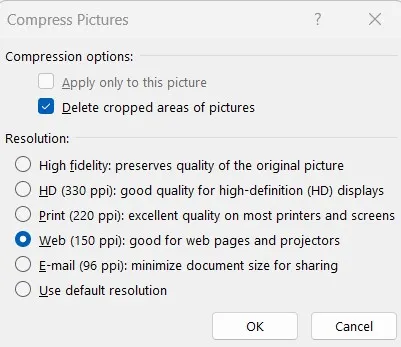
Note: If you don't tick the "Apply only to this picture" checkbox, then compression will occur to all images.
This way, you can instantly compress all the images and set a common resolution for all of them. Alternatively, you can use the above steps individually on selective images to only compress them.
2. Change Default Image Settings in PowerPoint
Like the compress pictures feature, you can also compress images in PowerPoint by changing the default image settings from the PowerPoint advanced options. Follow the below steps to compress images in PowerPoint by changing the default image settings:
- Open the PowerPoint presentation and click File > Options.
- Select the "Advanced" tab from the left sidebar. Under "Image Size and Quality", tick "Discard editing data", untick "Do not compress images in file", and set the resolution of your choice. Once done, click "OK".
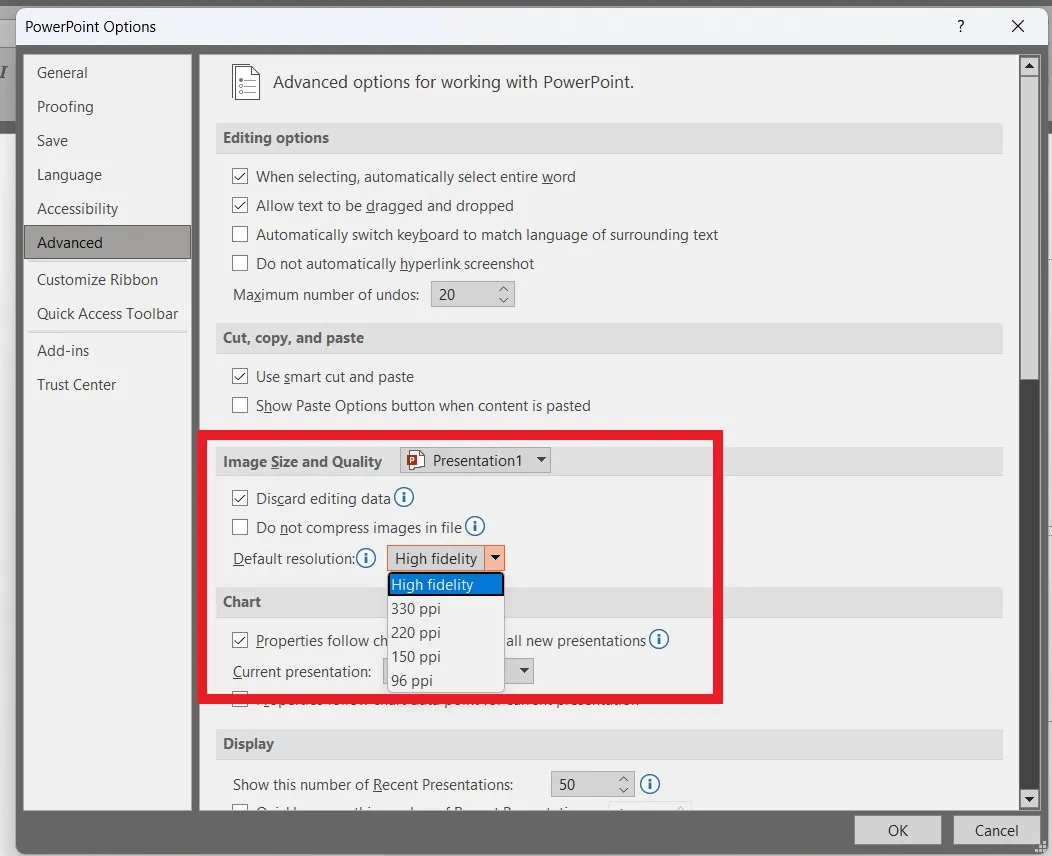
This way, all the images will be reconfigured to the new default image size and quality.
3. Insert Images Instead of Copy/Paste
Other than the above two methods that compress existing images in PowerPoint, you can also reduce the size of images while uploading them to PowerPoint. This is possible if you use PowerPoint's "Insert" feature instead of directly copying and pasting images. It is because when you copy and paste images in PowerPoint, they can lose existing compression, may change the file type, or bring more data with them. So, follow the below steps to learn how to use the "Insert" feature to insert images in the PowerPoint:
- Open the PowerPoint presentation and go to the slide where you want to add an image.
- From the top "Insert" tab, click Pictures > This Device.
- Select the image you want to add and click the "Insert" button.

This way, you can upload a much smaller-sized image using the right way of inserting the images in the PowerPoint.
4. Use the Copy of Artistic Effects Images
If your PowerPoint file contains images with artistic effects, then the size of those images will not reduce much with compression. Besides that, PowerPoint also keeps two copies of such images, i.e., the original copy and the artistic effect copy, increasing the overall PPT file size.
The best way to compress or reduce the size of such images is to save them as new images and then replace them with those copies. Follow the below steps to learn how to use the copy of artistic effect images:
- Open the PowerPoint presentation and go to the artistic effect image.
- Right-click the image and click "Save as Picture".
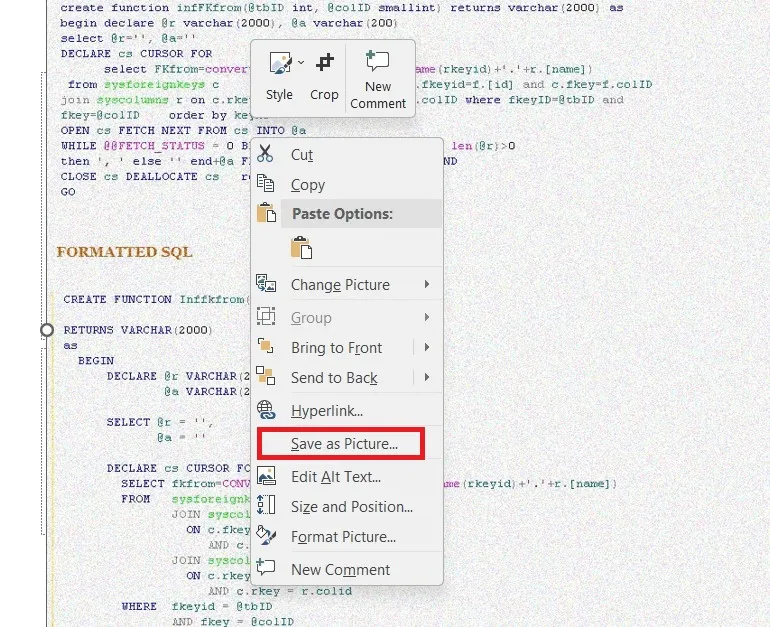
- Select the file type as "JPEG" and click the "Save" button.
- Remove the artistic effect image from the file and insert the duplicate image you just created.
This way, you can compress and reduce the size of artistic effects images without compromising the quality.
5. Use an Online Image Compressor
There are plenty of online image compressor websites that allow you to easily compress images by pressing a few simple clicks. All you have to do is upload, compress, download, and use compressed images on PowerPoint. Follow the below steps to compress images in PowerPoint using an online image compressor:
- Pick any online image compressor of your choice.
- Click the "Select images" button and upload the images you want to compress.
- Click the "Compress/Start" button to begin compression.
- Download the compressed images.
- Insert the compressed images into your PowerPoint file.
This way, you can compress images quickly and then insert them into PowerPoint.
Part 3. Best Way to Present PowerPoint Presentation Seamlessly Without Compressing Images
If you are concerned that compressing images in PowerPoint can compromise the image quality or affect the appealing visual you want to showcase to the audience, then you can present the PowerPoint presentation without compressing images. However, if you are running a large-sized presentation on an older PC, you might struggle with delays or other interruptions.
The best way to present a PowerPoint presentation without compressing images is by converting it into PDF format. It is because the PDF file size is much smaller than the PPT file, and the PDF also preserves the quality of images. But the next question is how to present a presentation in PDF format. This is where UPDF comes into action.
UPDF is a PDF editor that can address all PDF-related matters proficiently. It includes a built-in feature to turn PDF files into a slideshow, making it easy to present your PowerPoint presentation in PDF format.
Key Features of UPDF
- It provides a user-friendly interface with a click-based approach to quickly turn PDF files into a slideshow and easily start, replay, or stop the slideshow.
- It provides multiple slideshow options, i.e., play from start, play from the current slide, and use presenter view.
- Its "Presenter View" slideshow provides two options to manage slide layouts, i.e., slide navigation and next slide.
- It provides laser pens to highlight specific content or areas in the slide while showing the slideshow.
- It allows modifying the text and images present in the PDF.
- It helps further enhance the PDF's attractiveness by adding stickers, signatures, stamps, or other customizations.
Windows • macOS • iOS • Android 100% secure
In short, UPDF serves as an ideal tool to smoothly present large-sized, uncompressed PowerPoint files in PDF format. Follow the below steps to use the slideshow feature of UPDF to present PowerPoint presentation in PDF format:
Step 1. Open the PowerPoint file and click File > Save as. Under "Save as Type", choose "PDF" and click the "Save" button. This way, your PowerPoint file is converted into PDF.
Note: For Windows users, they can directly drag and drop the PowerPoint file into UPDF to easily change it to a PDF.
Step 2. Download and launch UPDF on your computer. Click the "Open File" button to open your created PDF file.
Step 3. Click the "View" tab from the top toolbar and then click "Slide Show" and choose from where to start the slideshow.
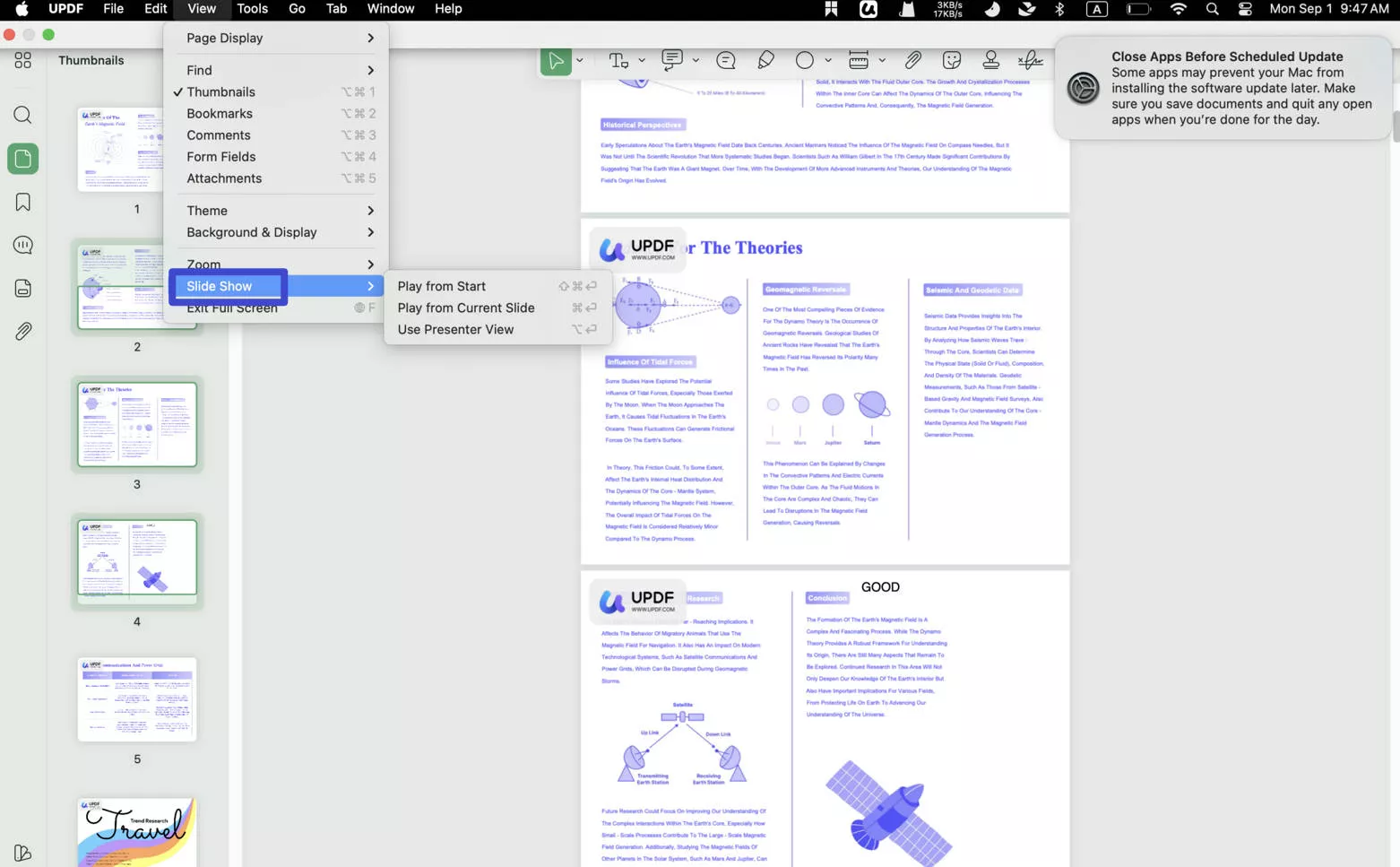
Step 4. If you want to highlight something while presenting, click the small "pencil" icon from the bottom left corner and select the "Laser Pointer" option. Afterward, choose the pen of your choice and use your mouse to highlight the content in the presentation.
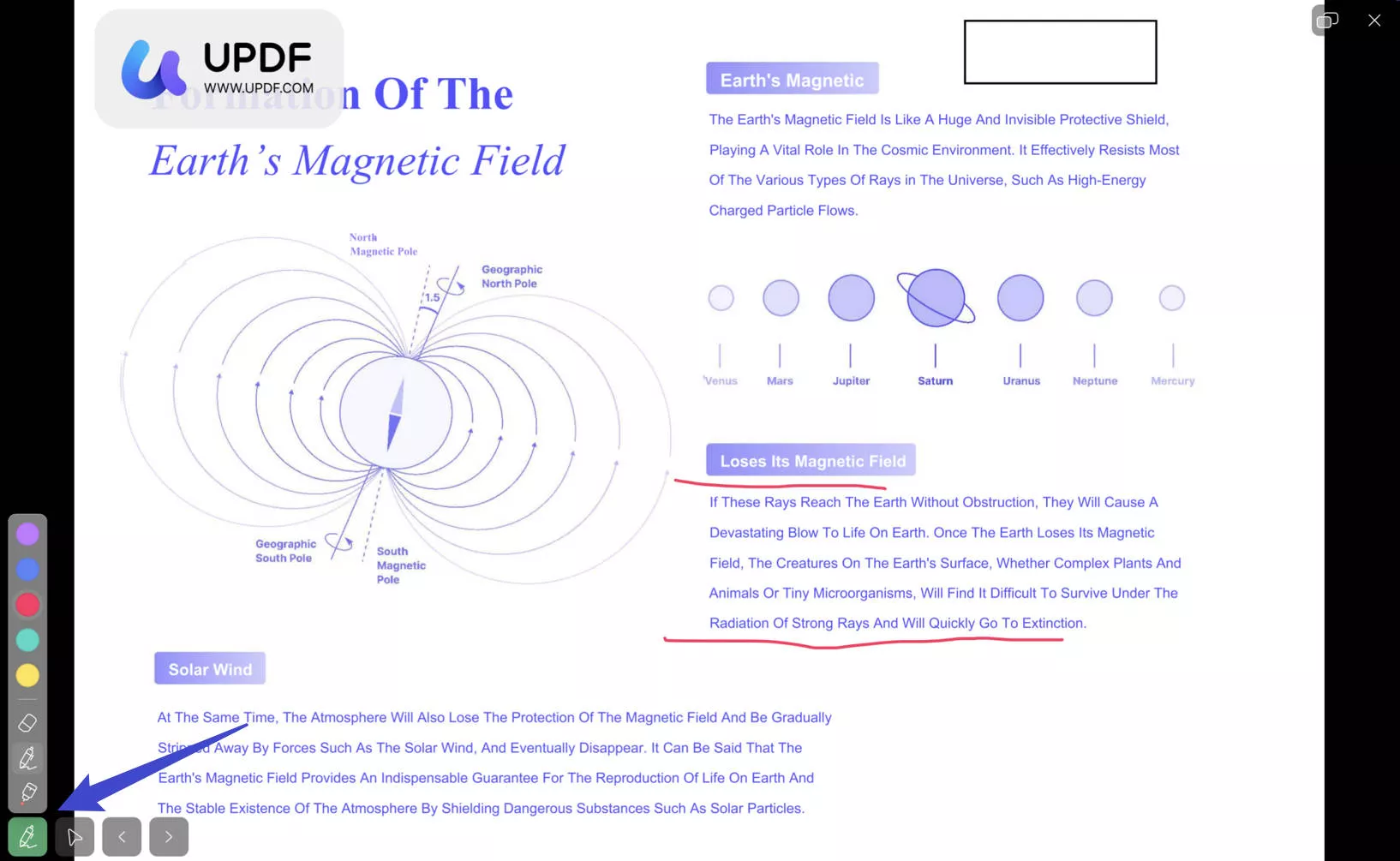
This way, you can seamlessly present the PowerPoint presentation in PDF format without compressing the images.
Windows • macOS • iOS • Android 100% secure
Bonus Tip: If the converted PDF version of the PowerPoint file is still too large, then you can use the UPDF compress feature to reduce the file size of the PDF. To do that, click the narrow next to "Save" icon from the right sidebar and choose "Reduce File Size". Afterward, select the document quality of your choice and save the file. This way, you can reduce the PDF file size and make it easy to process and share.
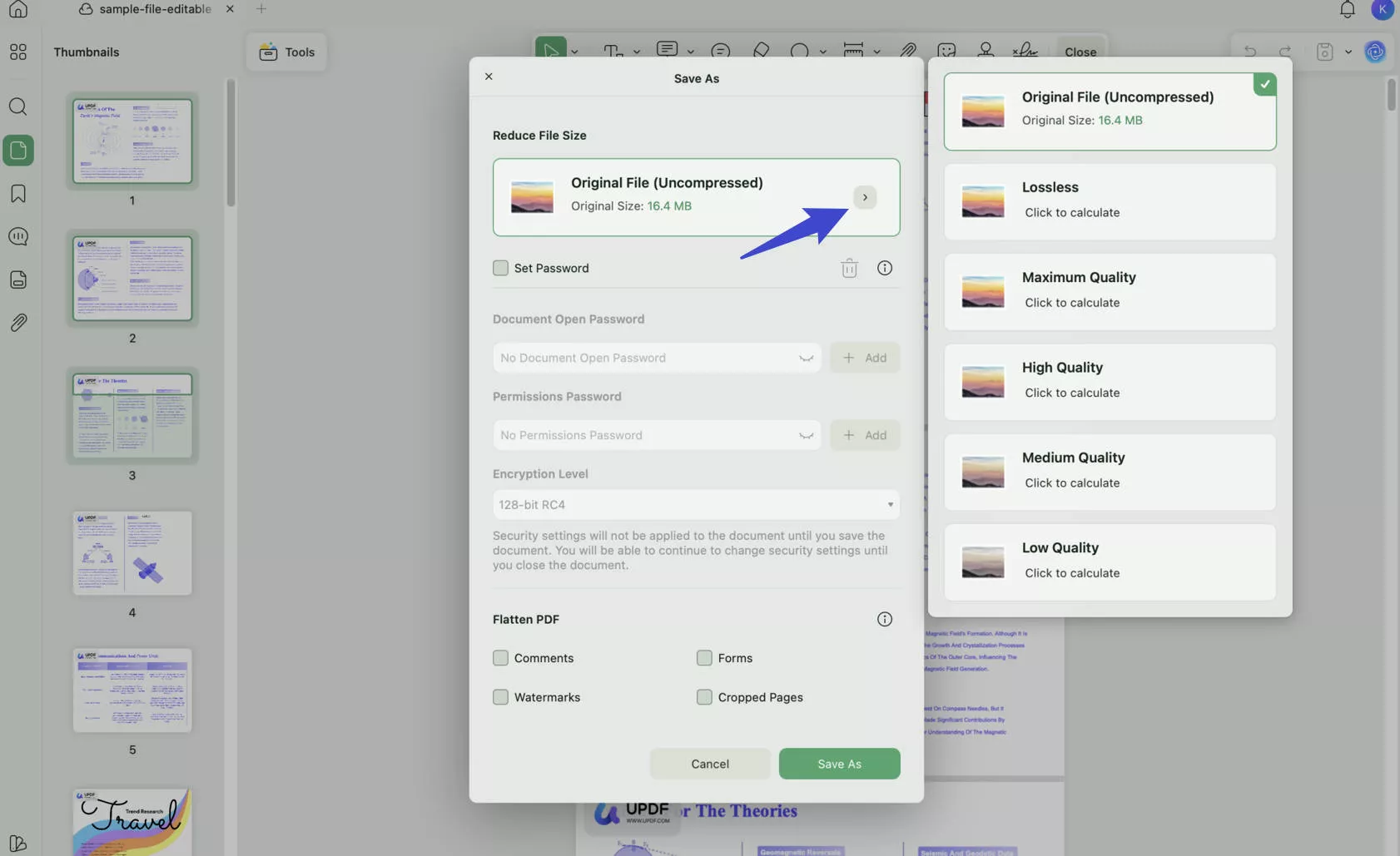
Wrapping Up
When the file size of a PowerPoint becomes significantly large, it is not uncommon to see users looking for ways to compress images in PowerPoint. Above, we have discussed multiple ways to compress images in PowerPoint. You can choose any of the above methods that align with your compression needs. However, if you don't want to compress images and still want to present a large-sized PowerPoint file, then the PDF slideshow feature of UPDF is the best choice. UPDF's intuitive interface, feature-rich slideshow functionality, and other editing capabilities make it the best tool for presenting large PowerPoint files in PDF format.
 UPDF
UPDF
 UPDF for Windows
UPDF for Windows UPDF for Mac
UPDF for Mac UPDF for iPhone/iPad
UPDF for iPhone/iPad UPDF for Android
UPDF for Android UPDF AI Online
UPDF AI Online UPDF Sign
UPDF Sign Edit PDF
Edit PDF Annotate PDF
Annotate PDF Create PDF
Create PDF PDF Form
PDF Form Edit links
Edit links Convert PDF
Convert PDF OCR
OCR PDF to Word
PDF to Word PDF to Image
PDF to Image PDF to Excel
PDF to Excel Organize PDF
Organize PDF Merge PDF
Merge PDF Split PDF
Split PDF Crop PDF
Crop PDF Rotate PDF
Rotate PDF Protect PDF
Protect PDF Sign PDF
Sign PDF Redact PDF
Redact PDF Sanitize PDF
Sanitize PDF Remove Security
Remove Security Read PDF
Read PDF UPDF Cloud
UPDF Cloud Compress PDF
Compress PDF Print PDF
Print PDF Batch Process
Batch Process About UPDF AI
About UPDF AI UPDF AI Solutions
UPDF AI Solutions AI User Guide
AI User Guide FAQ about UPDF AI
FAQ about UPDF AI Summarize PDF
Summarize PDF Translate PDF
Translate PDF Chat with PDF
Chat with PDF Chat with AI
Chat with AI Chat with image
Chat with image PDF to Mind Map
PDF to Mind Map Explain PDF
Explain PDF Scholar Research
Scholar Research Paper Search
Paper Search AI Proofreader
AI Proofreader AI Writer
AI Writer AI Homework Helper
AI Homework Helper AI Quiz Generator
AI Quiz Generator AI Math Solver
AI Math Solver PDF to Word
PDF to Word PDF to Excel
PDF to Excel PDF to PowerPoint
PDF to PowerPoint User Guide
User Guide UPDF Tricks
UPDF Tricks FAQs
FAQs UPDF Reviews
UPDF Reviews Download Center
Download Center Blog
Blog Newsroom
Newsroom Tech Spec
Tech Spec Updates
Updates UPDF vs. Adobe Acrobat
UPDF vs. Adobe Acrobat UPDF vs. Foxit
UPDF vs. Foxit UPDF vs. PDF Expert
UPDF vs. PDF Expert



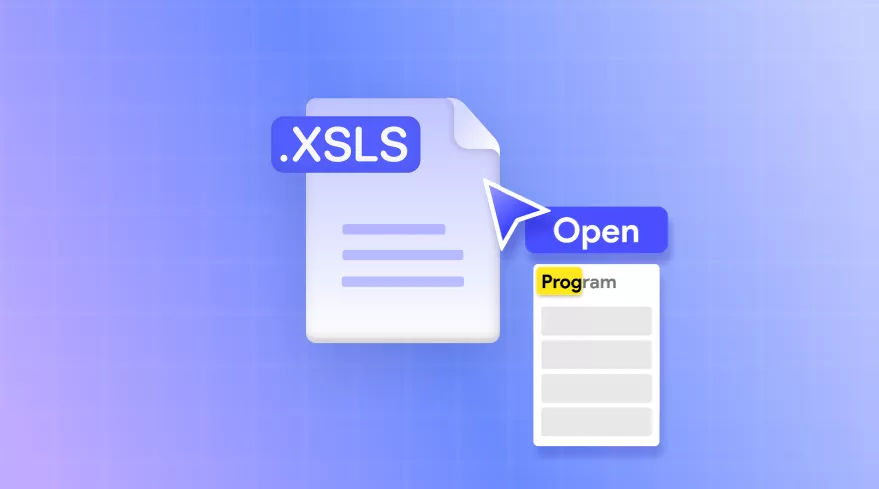


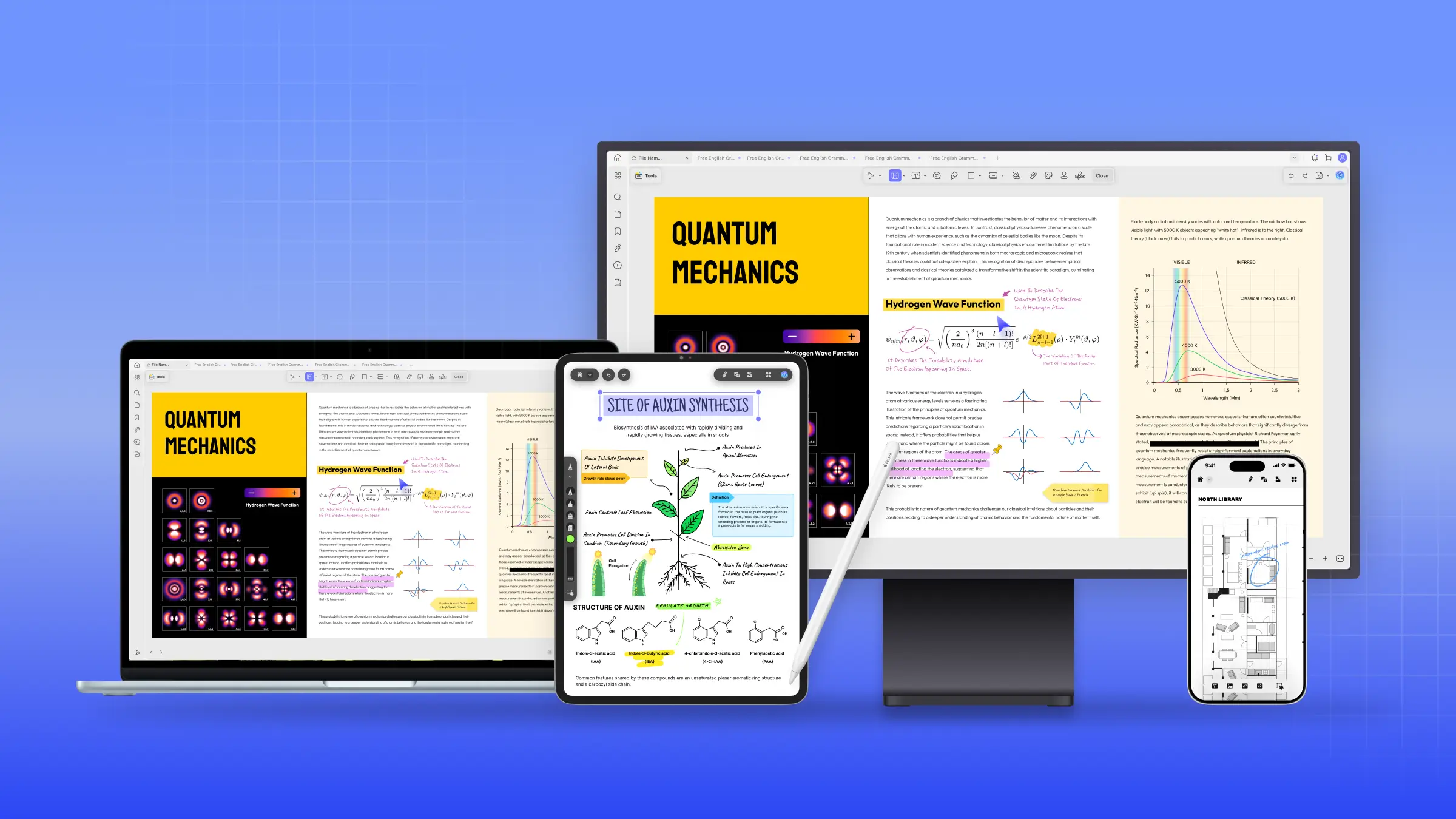

 Engelbert White
Engelbert White 



